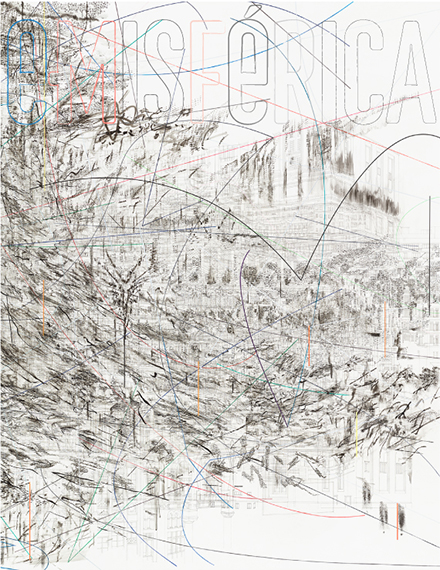TÉRMINOS CLAVES DE LA TEORÍA POSTCOLONIAL LATINOAMERICANA: DESPLIEGUES, MATICES, DEFINICIONES
I Coloquio del Centro de Investigaciones y Estudios en Teoría Poscolonial, Facultad de Humanidades y Artes, UNR
2, 3 y 4 de julio de 2012
Facultad de Humanidades y Artes
Universidad Nacional de Rosario, Argentina
Conferencia Inaugural
DR. GUSTAVO VERDESIO
University of Michigan – Miembro del CIETP
Conferencia de Cierre
DR. ÁLVARO FERNÁNDEZ BRAVO
New York University Buenos Aires– CONICET – Miembro del CIETP
Presentación especial y debate
POSCOLONIALISMO, POSCOLONIALIDAD, DECOLONIALIDAD
DRA. ZULMA PALERMO
Universidad Nacional de Salta
También presentaremos
TIEMPOS DE HOMENAJES / TIEMPOS DESCOLONIALES: FRANTZ FANON
Dr. ALEJANDRO DE OTO (Comp.)
CONICET, CCT Mendoza, Miembro del CIETP
Objetivos y ejes de reflexión
Este I Coloquio del Centro de Investigaciones y Estudios en Teoría Poscolonial tiene como objetivo inaugurar un espacio de discusión interdisciplinario e interregional sobre los conceptos y términos claves de la teoría poscolonial, y articular un diálogo crítico sobre los mismos desde el entorno específico de América Latina. Dicho diálogo tendrá como fin matizar las distintas ramas crítico-teóricas y los campos de aplicación relacionados con esta heterogénea vertiente teórica (tales como la teoría poscolonial latinoamericana, el giro decolonial, los estudios subalternos, los estudios latinoamericanos, los estudios coloniales), y cotejar su circulación y difusión a la luz de la meta más amplia de la descolonización epistémica, disciplinaria y académica. Nos interesa recibir trabajos que aborden alguno de los siguientes ejes, a fines de promover una reflexión crítica colectiva e interdisiciplinaria sobre los mismos.
- El impacto del pensamiento decolonial en el arte y la literatura latinoamericanos desde la colonia hasta hoy. Arte, literatura y subjetividades (pos)coloniales. Diálogos e intercambios entre las producciones artísticas y/o literarias contemporáneas y las configuraciones culturales surgidas en la etapa colonial: discrepancias, sincronías o convergencias. Crónicas visuales, estrategias gráficas y contradiscursos en el campo de la imagen.
- El impacto de la teoría poscolonial y sus vertientes latinoamericanistas en el ámbito de disciplinas específicas, sus metodologías, sus categorías críticas, y la propuesta transdisciplinaria en este marco, especialmente en el ámbito institucional y político de las universidades e instituciones académicas latinoamericanas.
- Subjetividades (pos)coloniales: cuestiones de raza, etnia, género, sexualidad.
- Problemas, desafíos y ventajas de la inclusión de la teoría poscolonial en sus diferentes vertientes en la currícula universitaria.
- Reflexiones crítico-teóricas sobre términos claves tales como: colonial, imperial, poscolonial, sujeto colonial, hibridez, ambivalencia, entrelugar, subalternidad, diáspora, nación, colonialismo interno, descolonización, etc.
- Problemas de traducción, circuitos de producción y recepción de la teoría (pos)colonial.
- La recepción, problematización, formulación y/o reformulación de términos tales como colonialidad/modernidad, decolonialidad, liberación, raza, género, imperialismo, subalterno/subalterna, territorio, colonialismo académico, etc. en Latinoamérica, a través del estudio crítico de las teorías del grupo colonialidad/modernidad/decolonialidad.
- La recepción, problematización, formulación y/o reformulación de términos tales como discurso colonial, semiosis colonial, discursividad mestiza, discursividad criolla, sujeto colonial, agencias criollas, mestizaje, mulatez, sincretismo, transculturación, etc. en los estudios coloniales y (pos)coloniales latinoamericanos.
Instrucciones para el envío de resúmenes y ponencias
Enviar un mensaje de correo electrónico a cietp_unr@hotmail.com. Especificar en asunto del mensaje “Coloquio 2012”
En el cuerpo del mensaje de correo electrónico, por favor consignar los siguientes datos:
- Nombre completo
- Afiliación académica y/o pertenencia institucional
- Dirección Postal
- Teléfono
- Email
En un archivo adjunto (.doc o .rtf, por favor no enviar archivos en .docx), guardado bajo título APELLIDODEL AUTOR.doc o APELLIDODEL AUTOR.rtf (por ej. Martínez.doc o Martínez.rtf), incluir:
- Título
- Resumen (200 palabras, en castellano )
- Palabras clave (en castellano)
Fecha límite para la recepción de resúmenes: 30 de abril, 2012
Fecha límite para la recepción de ponencias: 21 de junio, 2012
La propuesta será evaluada y se comunicará su aceptación antes del 15 de mayo de 2012.
Costo de la inscripción
Aranceles
Expositores/as: Podrá abonarse en la inscripción durante el Coloquio.
Nacionales $ 150
Nacionales Estudiantes $ 90
América Latina U$S 65
Otros U$S 100
Asistentes: Será abonado durante los días del Coloquio.
Nacionales $ 50.
Nacionales Estudiantes $ 20.
América Latina U$S 20.
Otros U$S 30.
Publicación de las ponencias
Está prevista la publicación de las actas del Coloquio. Tras la realización del Coloquio, se enviará la información sobre el modo de presentación de los trabajos para participar de dicha publicación.


.jpg)

